2021 年广西百色中考英语真题及答案
(考试时间:120 分钟;满分:120 分)
注意事项:
1. 答题前,请认真阅读试卷和答题卡上的注意事项:
2. 本试卷分为第 1 卷(选择题)和第 1 卷(非选择题)两部分。答第 1 卷时,用 2B 铅笔
把答题卡上对应题目第 1~70 小题的答案标号涂累;答第 II 卷时,用直径 0.5mm 黑色字迹
签字笔将答案写在答题卡上,在本试卷上作答无效;
3. 考试结束后,将试卷和答题卡一并交回。
第Ⅰ卷 选择题(共三部分 满分 90 分)
第一部分 听力理解(共四节,满分 30 分)
第一节 听音辨图(共 5 小题,每小题 1 分,满分 5 分)
听下面五个句子,从所给的 A、B、C、D、E、F 六个选项中选出与所听句子内容相符的图画。
听完每个句子后,你将有 10 秒钟的时间来选择其对应选项。其中有一选项为多余选项。每
个句子仅读一遍。
A.
D.
B.
E.
C.
F.
1. ________
2. ________
3. ________
4. ________
5. ________
第二节 情景反应(共 5 小题,每小题 1 分,满分 5 分)
听下面五个句子,每个句子后有一个小题,从题中所给的 A、B、C 三个选项中选出最佳的
答语。听完每个句子后,你将有 10 秒钟的时间来回答有关小题和阅读下一小题。每个句子
仅读一遍。
6. A. I'm Nancy.
B. I'm OK.
C. How do you do?
7. A. Yes, I can.
B. Yes, I do.
C. Yes. I am.
�
8. A. History.
B. Blue.
C. Cake.
9. A. Fine, thanks.
B. It's hot.
C. With pleasure.
10. A. Yes, I have.
B. You are welcome.
C. You, too.
第三节 对话理解(共 10 小题,每小题 1 分,满分 10 分)
听下面六段对话,每段对话后有一至三个问题,从题中所给的 A、B、C 三个选项中选出最
佳选项。听每段对话前,你将有时间阅读各个小题,每小题 5 秒钟。听完后,各小题将给
出 5 秒钟的作答时间。每段对话读两遍。
听第一段对话,回答第 11 小题
11. What kind of noodles does the man want?
A. Egg noodles.
B. Beef noodles.
C. Chicken noodles.
听第二段对话,回答第 12 小题
12. Why can't Mary go to the party?
A. She has the flu.
B. She has to study for a test.
C. She wants to sleep.
听第三段对话,回答第 13 小题
13. How often does Chen Tao exercise?
B. Twice a week.
C. Three times a week.
A. Once a week.
听第四段对话,回答第 14、15 小题
14. What does the girl want to be when she grows up?
A. A doctor.
B. A teacher.
C. A pianist.
15. Where would the boy like to work?
A. In Beijing.
B. In Guangzhou.
C. In Wuhan.
听第五段对话,回答第 16、17 小题
16. What are they talking about?
A. Visiting the space museum.
B. Visiting the history museum.
C. Visiting the art museum.
�
17. Who has been to the museum before?
A. Tina.
B. John.
C. Neither of them.
听第六段对话,回答第 18 至 20 小题
18.Why doesn't Mom agree the boy to go to the shopping center by electric scooter
(电动车)?
A. Because she is worried about the heavy traffic.
B. Because she is worried about the boy's safety.
C. Because she is worried about the bad weather.
19. What does the boy want to buy in the shopping center?
A. A new jacket.
B. A new shirt.
C. A new T-shirt.
20. Will Mom go to the shopping center with the boy in the end?
A. Yes. she will.
B. No, she won't.
C. It's not mentioned.
第四节 短文理解(共 5 小题,每小题 2 分,满分 10 分)
听下面一篇短文,短文后有 5 个小题,从题中所给的 A、B、C 三个选项中选出最佳选项。
听短文前,你将有时间阅读各个小题,每小题 5 秒钟。听完后,各小题将给出 5 秒钟的作
答时间。短文读两遍。
听下面一篇短文,回答第 21 至 25 小题
21. The students will go to the old people's home on________.
A. October 14th
B. October 4th
C. November 4th
22. How will the students go to the old people's home?
A. On foot.
B. By bike.
C. By bus.
23. The students will meet at the school gate at________ on that morning.
A. 8: 30
B. 8: 45
C. 9: 00
24. Which of the following activities is not mentioned in the passage?
A. Reading a newspaper to the old people.
B. Making dinner for the old people.
C. Taking a photo of the old people.
25. The students can call Mr. Chen at________.
A. 0776-2851876
B. 0776-2815876
C. 0776-2858176
�
第二部分 英语知识运用(共三节,满分 25 分)
第一节 选择填空(共 10 小题,每小题 1 分,满分 10 分)
从 A、B、C 和 D 四个选项中,选出可以填入空白处的最佳选项。
1. The Communist Party of China was founded________ July 1st, 1921.
A. in
【答案】B
B. on
C. at
D. /
2. I usually have________ breakfast at 7 o’clock, and I had ________ big breakfast
this morning.
A. /, a
【答案】A
B. a, a
C. /. the
D. a, the
3. —Jenny, is that bag on the desk________?
—No, it isn't________ bag, it is Lily's.
A. yours, mine
B. your, mine
C. your, my
D. yours,
my
【答案】D
4. Uncle Li has a farm, there are some________ on the farm.
A. chicken and sheep
B. chickens and sheeps
C. chickens and sheep
D. chicken and sheep
【答案】C
5. I used to ________ at half past six, but now I am getting used to ________at seven.
A. getting up, get up
B. get up, getting up
C. got up, getting up
D. got up,
get up
【答案】B
6. I ________ this bike for three years. I like it so much.
A. bought
B. had
C. have bought
D. have
had
【答案】D
7. Paper, one of the four greatest inventions in ancient China, ________by Cai Lun
about 2, 000 years ago.
A. was invented
B. is invented
C. were invented
D. are
�
invented
【答案】A
8. —________ fast China is developing!
—Yes, we are so lucky to live in such a great country!
A. What
【答案】C
B. What a
C. How
D. How a
9. Could you please tell me ________? I want to borrow some books.
A. where is the library
B. where the library is
C. where was the library
D. where the library was
【答案】B
10. —Don't cross the road when the traffic lights are red next time!
—________.
A. It doesn't matter
B. Not at all
C. Don't worry
D. Sorry,
I won't
【答案】D
第二节 补全对话(共 5 小题,每小题 1 分,满分 5 分)
根据对话内容,从选项中选出 5 个最佳选项补全对话。其中有一选项为多余选项。
A: Hi, my name’s Li Lei. It’s my first day at our school.
B: Hi, Li Lei. I’m Daming. This is a great school, but there are a lot of rules.
A: ___11___
B: First, we have to wear the school uniform every day. ___12___
A: I see. ___13___
B: Yes, you can, but you can’t listen to music in the classroom or hallways,
A: ___14___
B: You’d better not. If you do so, you must hand it in to your headteacher.
A: What else?
B: ___15___ But we can eat in the dining hall.
A: Thank you, Daming.
A. We can’t eat in the classroom.
B. What are the school rules?
�
C. This is very important.
D. Can I bring my smart phone to school?
E. Do we have to wear the school uniform?
F. Can I bring my music player to school?
【答案】11. B
12. C
13. F
14. D
15. A
第三节 完形填空(共 10 小题,每小题 1 分,满分 10 分)
阅读下面短文,掌握其大意,然后从第 41~50 小题所给的 A、B、C 和 D 四个选项中,选出
可以填入空白处的最佳选项。
Wang Kai is a boy who is 15 years old. He works hard and does ___16___ in school.
But it is hard to believe that he used to have difficulties in school.
When his parents moved to ___17___ city to work, they could not be at home to
look after him. So he became ___18___ in studying and was absent from classes. He
hated being in groups. and he was ___19___ all the time. Then his parents decided
to send him to a boarding school. He found life there ___20___ .
One day, Wang Kai told his teacher he wanted to ___21___the school. His teacher
advised his parents to talk with ___22___son in person. The father took a 6-hour
train and a 2-hour bus ride to the boarding school, and he had a conversation ___23___
his son. This conversation changed Wang Kai’s ___24___ and he chose to stay at the
school. He realized that his parents would always love him, and they would ___25___
everything good that he did.
Now he is much happier and more outgoing than he used to be.
16. A. good
B. badly
C. well
D. bad
17. A. other
B. others
C. the other
D.
another
18. A. less interestingB. less interested
C. more interesting
D. more
interested
19. A. alone
B. active
C. outgoing
popular
20. A. easy
B. funny
C. comfortable
D.
D.
difficult
�
21. A. thank
B. introduce
C. leave
22. A. your
B. their
23. A. with
B. in
24. A. weight
B. school
subject
C. her
C. on
C. mind
D. visit
D. his
D. about
D.
25. A. give up
B. give away
C. take away
D. take
pride in
【答案】16. C
17. D
18. B
19. A
20. D
21. C
22. B
23. A
24.
C
25. D
第三部分 阅读理解(第 51—55 小题,每题 1 分:第 56~70 小题,每题 3 分)
A
Every morning, millions of people in China do Tai—chi. It is popular with women
and men. Tai-chi is a good kind of exercise for old people. It is good for the body
and for the mind. It is healthy and relaxing. Tai-chi is from China. It is hundreds
of years old. Tai—chi is a “soft” martial art(武术), That means it is slow and
calm.
There are also “hard” martial arts. Shaolin Kung—fu, for example, which has
a history of over 1, 500 years, is a “hard” martial art. It is fast and dangerous.
You have to be very fit and strong to do“hard”martial arts.
In Beijing, Master Li is teaching Shaolin Kung-fu to thirty young students, three
of them come from abroad. “Shaolin Kung-fu is difficult,” said Master Li. “You
must practise every move many times.”
Sports like football and basketball are also popular in China. But martial arts
like Tai—chi and Kung-fu are part of Chinese culture and history.
根据材料内容,判断下列句子意思与原文是否相符,相符的选 T,不相符的选 F。
26. Men like Tai-chi better than women do.
27. Tai-chi has a longer history than Shaolin Kung-fu.
28. People have to be very fit and strong to do Shaolin Kung-fu.
29. Master Li is teaching Tai-chi in Beijing.
30. Two kinds of martial arts are talked about in this passage.
�
【答案】26. F
27. F
28. T
29. F
30. T
B
In Britain you may often hear “Drop in any time” or “Come to see me soon”,
but you can’t really do that. People just say those things to make you feel welcome.
It is better to telephone before visiting someone at home. If you receive a written
invitation to an event that says “RSVP”. You should reply to let the person who
sent the invitation know whether or not you plan to go.
You should never accept an invitation unless you really plan to go. You may refuse
by saying, “Thank you for inviting me, but I will not be able to come.” If, after
accepting, you are unable to go, be sure to tell those who are expecting you as soon
as possible that you will not be there.
Though it is not necessarily expected that you give a gift to your host, it is
considered polite to do so, especially if you have been invited for a meal. Flowers,
chocolate, or a small gift are all appropriate(合适的). A thank-you note or telephone
call after the visit is also considered polite and is an appropriate way to express
your appreciation for the invitation.
根据短文内容,选出最佳选项。
31. What can you do when a British friend says, “Drop in any time”?
A. Visit him or her at any time.
B. Say no time to him or her
seriously.
C. Visit him or her soon.
D. Telephone him or her before
visiting.
32. What does the underlined word “RSVP” probably mean in Chinese?
A. 请自便
B. 请回复
C. 请接受
D. 请来访
33. What should you do if your British friend sends you an invitation but you do
not want to go?
A. Do not give him or her an answer.
�
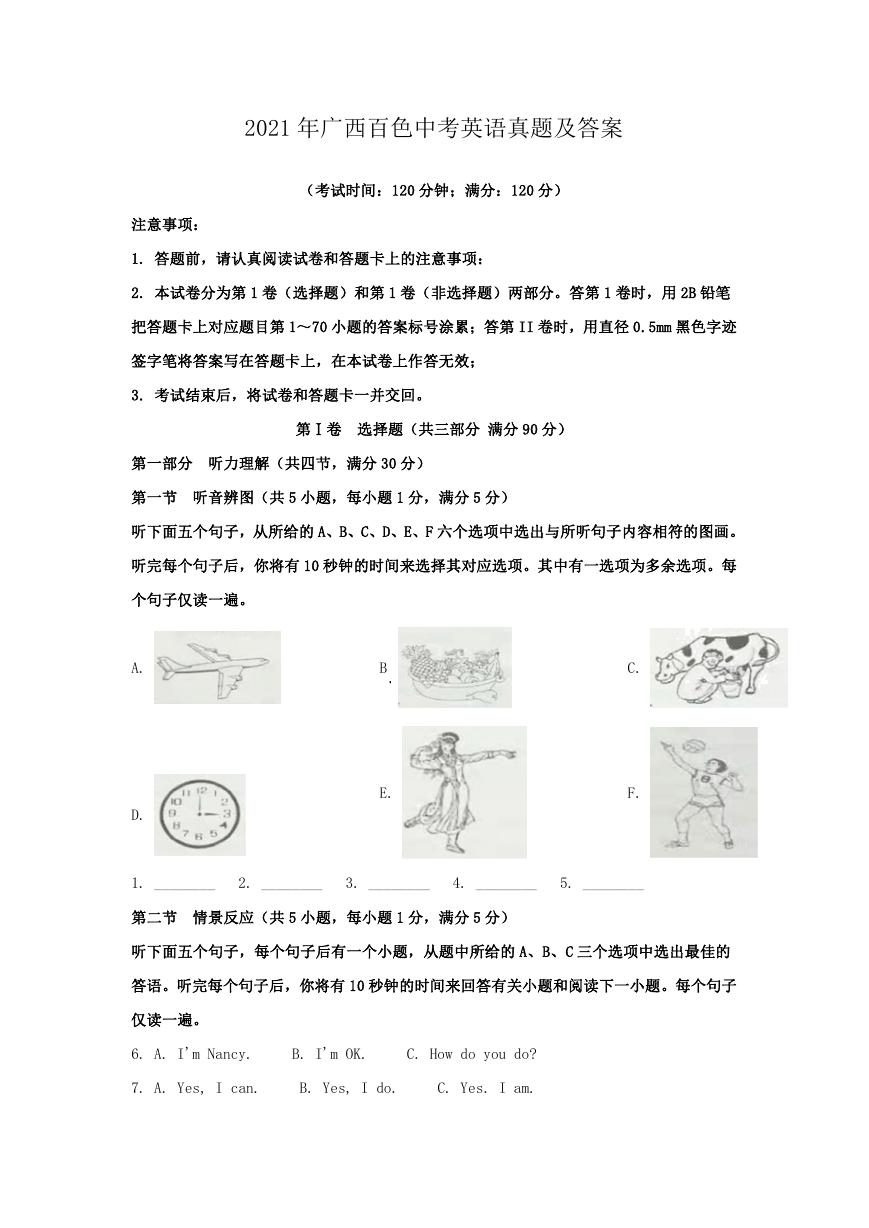


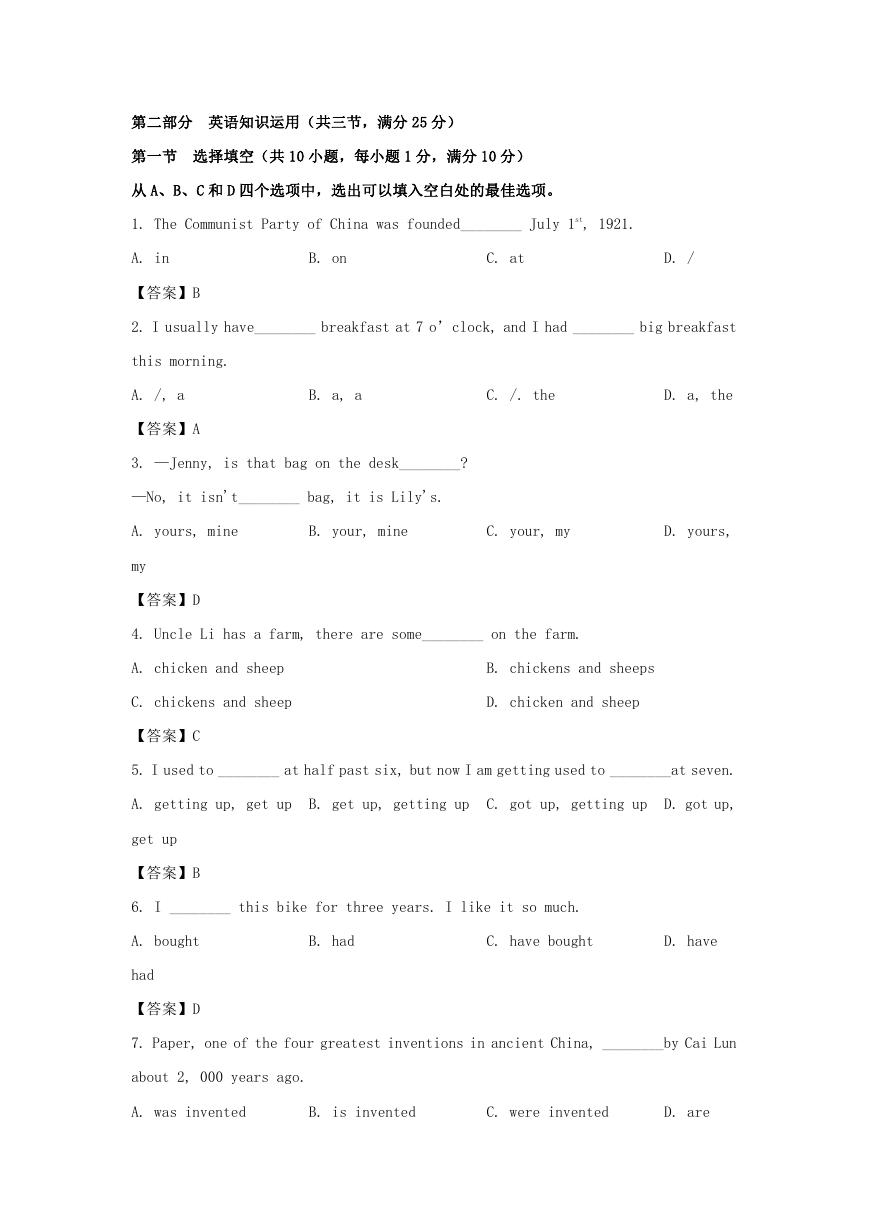
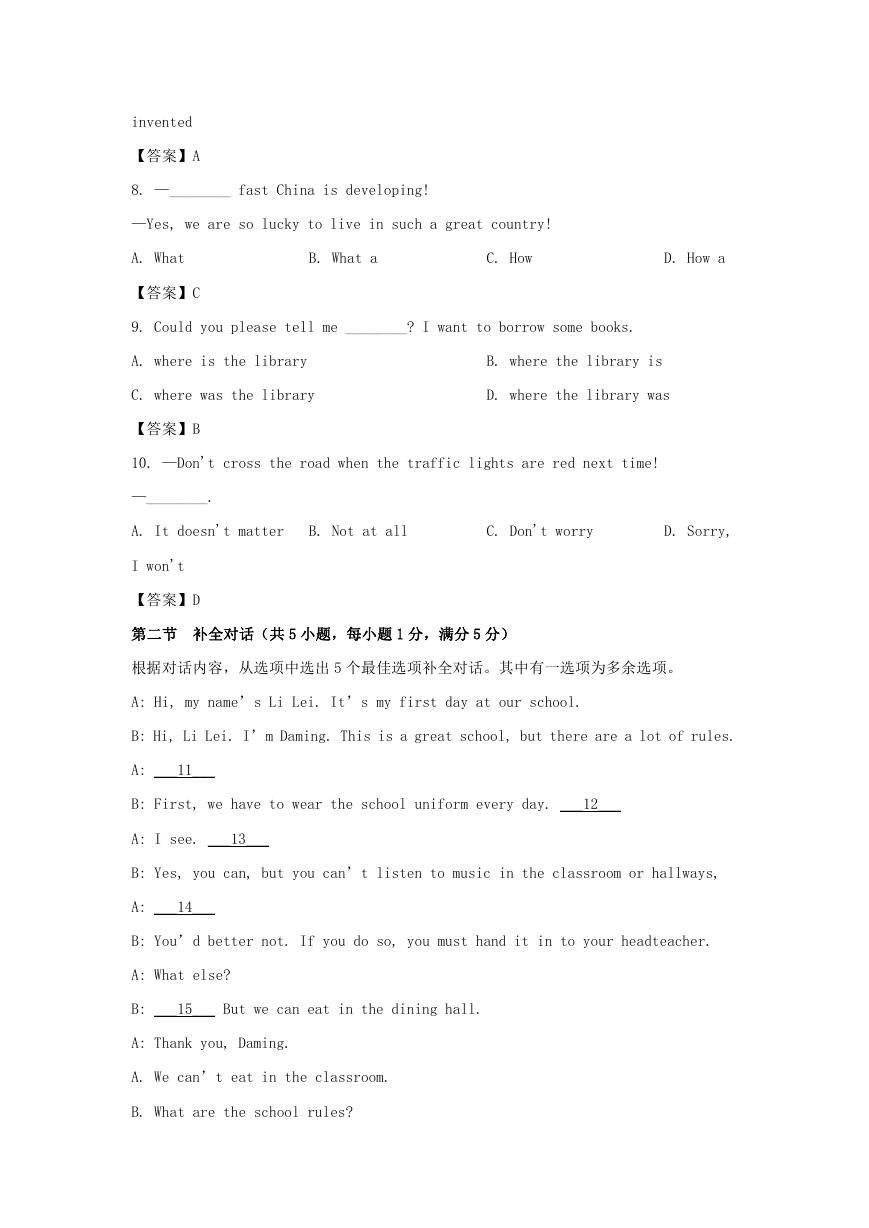
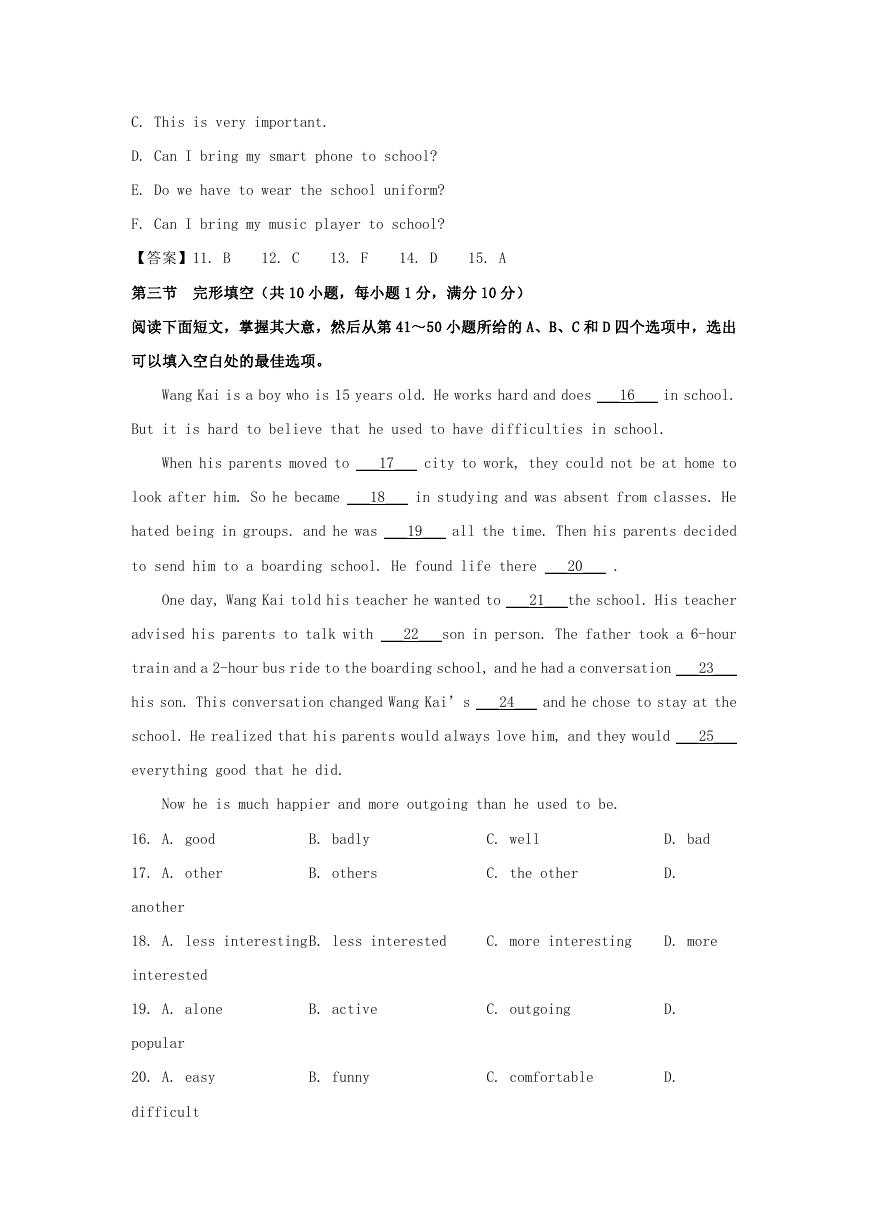
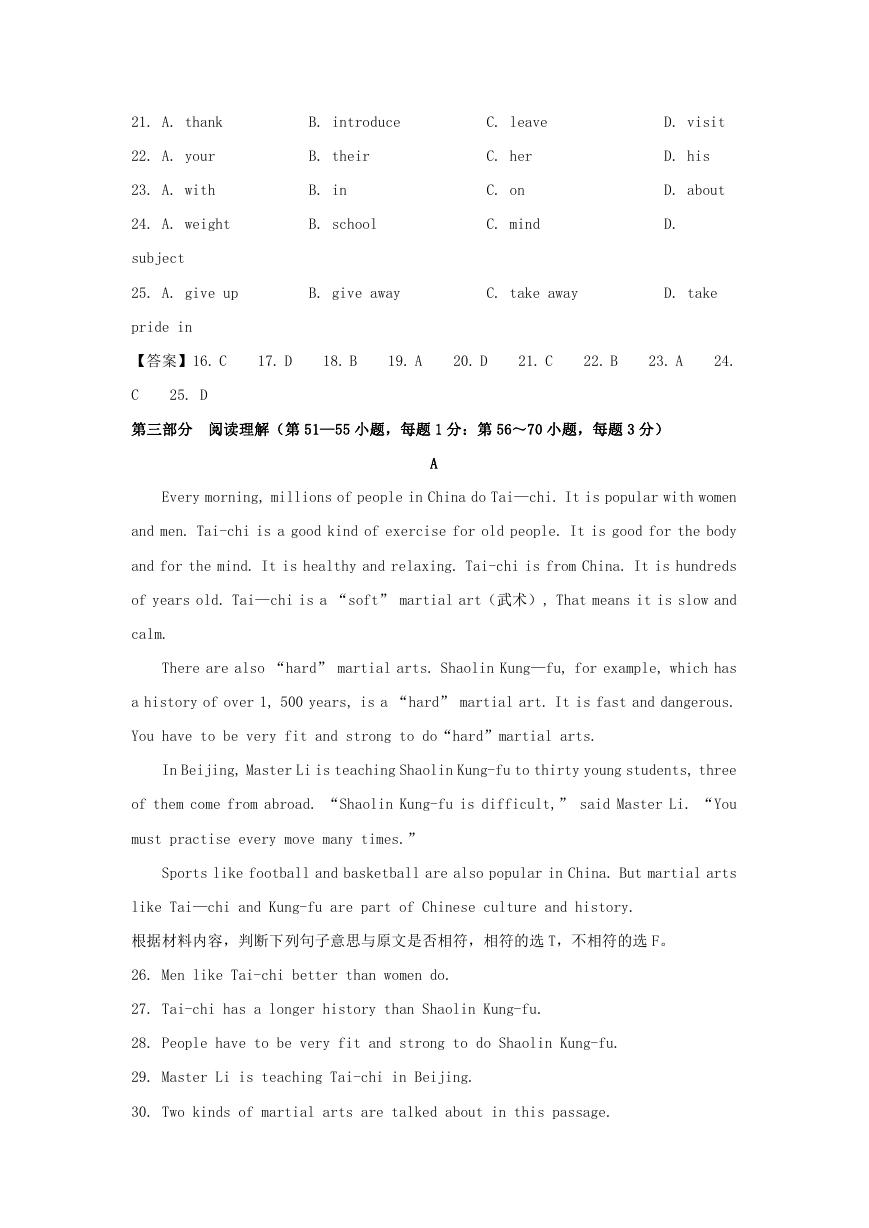
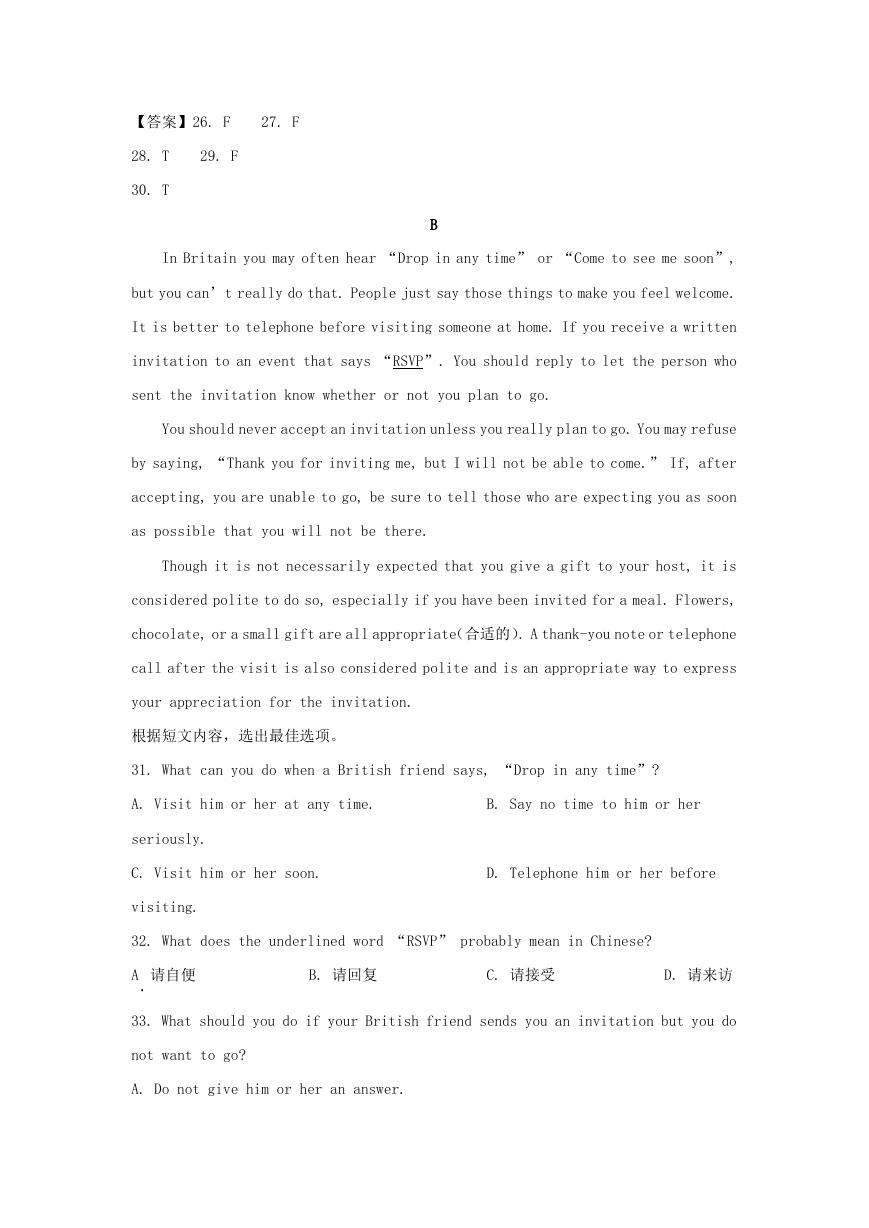








 2023年江西萍乡中考道德与法治真题及答案.doc
2023年江西萍乡中考道德与法治真题及答案.doc 2012年重庆南川中考生物真题及答案.doc
2012年重庆南川中考生物真题及答案.doc 2013年江西师范大学地理学综合及文艺理论基础考研真题.doc
2013年江西师范大学地理学综合及文艺理论基础考研真题.doc 2020年四川甘孜小升初语文真题及答案I卷.doc
2020年四川甘孜小升初语文真题及答案I卷.doc 2020年注册岩土工程师专业基础考试真题及答案.doc
2020年注册岩土工程师专业基础考试真题及答案.doc 2023-2024学年福建省厦门市九年级上学期数学月考试题及答案.doc
2023-2024学年福建省厦门市九年级上学期数学月考试题及答案.doc 2021-2022学年辽宁省沈阳市大东区九年级上学期语文期末试题及答案.doc
2021-2022学年辽宁省沈阳市大东区九年级上学期语文期末试题及答案.doc 2022-2023学年北京东城区初三第一学期物理期末试卷及答案.doc
2022-2023学年北京东城区初三第一学期物理期末试卷及答案.doc 2018上半年江西教师资格初中地理学科知识与教学能力真题及答案.doc
2018上半年江西教师资格初中地理学科知识与教学能力真题及答案.doc 2012年河北国家公务员申论考试真题及答案-省级.doc
2012年河北国家公务员申论考试真题及答案-省级.doc 2020-2021学年江苏省扬州市江都区邵樊片九年级上学期数学第一次质量检测试题及答案.doc
2020-2021学年江苏省扬州市江都区邵樊片九年级上学期数学第一次质量检测试题及答案.doc 2022下半年黑龙江教师资格证中学综合素质真题及答案.doc
2022下半年黑龙江教师资格证中学综合素质真题及答案.doc